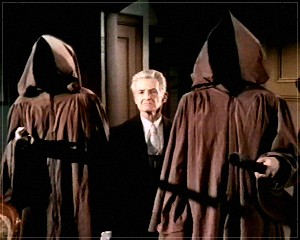"The Dangers of Independent Thinking"
Reading Mary's thread regarding the July 15th WT, I began to really consider what the WBTS' problem is with "independent thinking".
What exactly is "independent thinking" and what about its opposite, "dependent thinking"? I think the following excerpt from an article here does a good job of defining them. (Read the rest of that article.)
What is Independent Thinking?
The Oxford Unabridged Dictionary offers many definitions of "independent," including "not depending on the authority of others" and "not dependent on others for forming an opinion." Making up your own mind, in other words. But what does that really mean? Does it mean forming an opinion without input from others? No, of course not, otherwise we "reinvent the wheel" every time we make a decision. We all need relevant information and data on which to base our opinions. It's the way that we seek information and how we apply it that makes us dependent or independent thinkers. If we uncritically accept whatever values or ideas we've been taught by parents, teachers or church, never questioning these ideas or asking ourselves if these ideas really make sense, then we are dependent thinkers (even if the ideas are true!).
If we reject what our parents, teachers or church have taught us simply because they say something is right, does that make us independent thinkers? No, that's just what psychologists call "anti-conformity" rather than non-conformity. Making up your own mind is an action, not a reaction.Independent thinking means making sense of the world based on your own observations and experiences rather than just depending on the word of others. It means trusting your own ability to make judgments, even if they contradict what others say. It means acting in accordance with these judgments, even if you sometimes make mistakes. Independent thinkers know it's psychologically better to make your own mistakes than someone else's. Independent thinking is not necessarily rational or critical. Sometimes you make mistakes; sometimes it's difficult to know whether your beliefs are your own or simply uncritically borrowed. No one ever said independent thinking is easy. Critical thinking is a tool that can help you decide whether your old beliefs are sensible. It can help you examine new ideas or help you solve problems in reasonable ways.
What happens when an organization derides independent thinking? It is asking for dependent thinking (a phrase I don't think I have ever seen in any WT article or publication). In the case of the WBTS, it wants their congregation members to rely entirely upon the GB reasoning on any given subject. Is this not evident?
But why is this the case? Why such an emphasis against independent thinking?
My opinion on this matter is a bit controversial. Can one be an independent thinker and yet also worship Jehovah and/or follow Jesus' path? Can one be an independent thinker and be a member of an organized religion? Can one be an independent thinker and truly be a Christian at all?
As I see it, the very basic conflict is set up in Genesis. God says "obey", don't eat of the Tree of the Knowledge of Good and Bad or there will be consequences. In other words, God reserved the right to judge whether something is good or bad. Why is that? Then the serpent says that if you eat from the ToKoG&B, their eyes would be opened and they would be as God, able to judge for themselves whether something is good or bad. In other words, they would become independent thinkers.
So, if one ascribes to the independent thinking model, are they following the model that the Edenic serpent supports? Assuming, as many do, that the serpent was Satan, does that make independent thinkers followers of Satan by default. Satanists today are considered very humanistic individualists. What about a Christian who thinks of herself as an independent thinker? Isn't that person belying their own faith?
How can one accept rulings from God, as filtered through the bible, or religious authority and yet also be an independent thinker? Can one be an independent thinker in all ways except when it comes to rules passed down to humanity from God, through holy books such as those in the bible? What about those books that are not a part of the current bible? How can one be an independent thinker and yet shun the books such as the Book of Enoch and others, when the books in the OT/NT were chosen by a fleshly order, the Nicean Councils?
Does independent thinking ultimately equate to Satanism? And if so... well, that could be quite a crisis for many people.
